AcresUSA: Tractor Time
Advocacy
Episodes
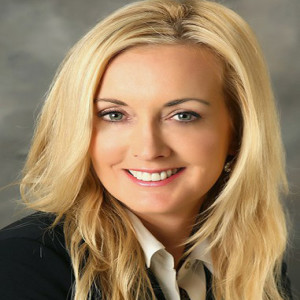
Monday May 20, 2019
Monday May 20, 2019
Hosted by Ryan Slabaugh
Sponsored by BCS America
Good day and welcome to Tractor Time podcast brought to you by Acres U.S.A., the Voice of Eco-Agriculture. I am your host, Ryan Slabaugh, and we are humbled to bring you the 30th episode. Today’s topic is one we have to talk about, but it’s not a whole lot of fun – Monsanto.
Our guest today, Carey Gillam, is a veteran reporter who has been covering corporate America for 25 years, including Monsanto and most recently, Bayer. This year, she’s been busy covering the Monsanto trials, suing agencies under the Freedom of Information Act, and discovering an amazing array of corruption that is fueling the more than 11,000 lawsuits against the company.
Mainly, she’s uncovered the fact that Monsanto has lied to and tricked farmers, land managers, growers, ranchers and city managers for 50 years about RoundUp. That as they tell their employees to behave differently around the product than they do consumers. And that they paid for fake science, paid off reporters, and got especially cozy with politicians around the world. France’s Parliament is exploring charges that they kept a list of politicians they liked and disliked. That’s nothing new to us here in the U.S., but that level of targeted lobbying does not go over so well elsewhere in the world. But the bottom line is, it’s toxic to human and animal health, and juries around the world that have heard their defenses do not see any redemption in them – in fact, it is quite the opposite. The lying has only added to their penalties, and their liabilities now range in the trillions, and Bayer’s stock price is 40% declined from where it was at the time they purchased Monsanto.’
Here’s a clip from the Canadian Public Broadcasting Channel’s recent coverage, which summarized the issue:
To be clear, we are talking about the specific formulation Monsanto uses in its RoundUp product that includes glyphosate – that’s an important distinction. Monsanto’s spokespersons deny all this and say there is no proof their product is unhealthy or shouldn’t be used. You can still find it everywhere, and even though towns and ciiteis are starting to make it illegal to use, it’s use is still prolific.
And who is fueling this worldwide coverage? Our guest today, Carey Gillam. She wrote a book called Whitewash: The Story of a Weed Killer, Cancer & the Corruption of Science, published by Island Press, in 2017. The way she threads her reporting in with current events paints a damning picture of Roundup, even garnering praise from Erin Brockovich.
And our guest today makes the strong point that banning RoundUp or glyphosate, or suing for billions, does not solve the real problem we are facing: an agriculture and food supply dependent on the lies that Monsanto has been giving farmers, and the safety nets are a bit too far down to feel comfortable leaping.
It’s our listeners who will really be solving this problem, but taking the information Carey gives us today to educate us on the forces at work in the herbicide world, and how we can make informed, healthy choices. You can make a difference by how you grow food, the food you buy at the store, and by the manner in which we defend eco-agriculture.
So, let’s get into the interview with our guest today: As a former senior correspondent for Reuters' international news service, and current research director for consumer group U.S. Right to Know, Carey Gillam's areas of expertise include biotech crop technology, agrichemicals and pesticide product development, and the environmental impacts of American food production. Gillam has been recognized as one of the top journalists in the country covering these issues.
A special thanks to our episode sponsor, BCS America.
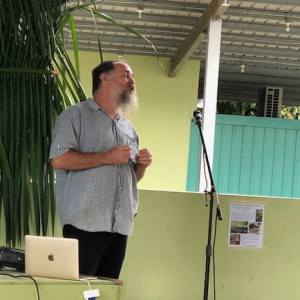
Friday Nov 16, 2018
Friday Nov 16, 2018
Hosted by Ryan Slabaugh
This episode is a bit unique from the others, which are usually done in the comforts of my office back in Greeley, Colorado. For most recordings, it’s me, a microphone, an interview guest and my dog snoring in the corner. If you need the full picture, I even prop a sign up in my windowed door that says, “On Air.” But that’s really just for me – it makes me feel official.
But so does this scene where I am today. Today, we are broadcasting from Belize, specifically, Belmopan, Belize, at the inaugural Tropical Agriculture Festival. We first met one of the organizers, Beth Roberson, a Belizian farmer, in Columbus, Ohio, last year during our annual conference. Beth left inspired to start her own educational conference down here, picked our brains a bit, and recruited some of our speakers and former Tractor Time guests like regenerative poultry specialist Reginaldo Haslett-Marroquin and Regeneration International’s André Leu, among others.
Let me set the stage a bit. Belize is a small country of about 350,000 people, just south of Mexico and east of Guatemala. It’s known for having the second largest reef in the world off its coast, and for being an English colony until the early 1980s. The country, very proud of its freedom, is still finding its feet. The Guatemalan president threatens them with invasion, and England still has a small standing army there as a reminder to their neighbors.
Belmopan is a small town of a few thousand, and wears a few scars. The main roads are paved, but most are not, but a fountain roundabout greets visitors on the Western Highway. A bar-restaurant called “Cheers” greets guests as they arrive into town before a roundabout — I met the owner, and she told me she also runs a “small” farm behind it that includes horses, sheep, cattle, goats and chickens, and yes, she composts from the restaurant. On the other side of the highway, the entrance to a national park. Inside the town, a large agriculture grounds with stages, test gardens and plenty of native trees. This is where the festival was held this week.
The event started with the national anthem, sung by an 8-year-old local schoolgirl. It’s clear from the anthem what the country does not want — tyrants and colonizers. And it’s clear that they want to be a free country, although they are still grappling with which economy will drive its future. The tourism economy, which favors hotels and airports and large ports, or a more local economy, where manufacturing, agriculture and other jobs will fill the gap.
Agriculture, though, will have some part. It has to. Or at least, it’d be silly not to. Pineapples, mangoes, bananas, jackfruits, etc. From any city, it doesn’t take long to be in the country, where anyone would be taken in by the variety of flora, fauna and wildlife, which range from toucans to jaguars to crocodiles. Our first hour in the country, as we pulled into our hotel, the sounds of howler monkeys greeted us. (You’ll have to listen to the podcast for the full effect.)
The next day, the conference began. We heard a resounding call to action from Ronnie Cummins, on the board with Regeneration International, which was followed by two days of educational speeches on five different stages, ranging from permaculture to seed saving to agritourism. All were rooted in how Belize can transform its agriculture into one of the world’s best. And no matter what, you have to give something to a country that starts its weekends on Thursday nights.
Here’s what clips you can find on the podcast. Also, you’ll hear some thumping in the background, and truck noise. I apologize for that recording issue – (I wasn’t counting on so much foot stomping on stage when I set up the microphone, nor could I do much about the nearby highway traffic.)
Ronnie Cummins, Board Member of Regeneration International
Here’s that talk from Ronnie that opened up the conference. It’s about 16 minutes, and full of fire and fury.
Taylor Walker, Biodiverse Systems Designer
Next, a highlight I recorded from Taylor Walker. A jack-of-all trades who designs gardens and permaculture environments, including Naples Botanical Gardens, Inland ecology Research Group, Sanibel Sea School and others. In Belize, he is managing Tropical Agro-Forestry farms.
I’ll play a few minutes of his talk, as he walks about 50-60 people in his class through specific plants that grow well in Belize, like bread fruit.
Christopher Nesbitt, Regenerative Agriculturist
Christopher Nesbitt, a regenerative agriculturist, has spent 30 years restoring a piece of damaged land in the Maya foothills. His land is now filled with more than 500 species of plants, all of which are harvestable. His talk was about his work. Here’s just a piece about that biodiversity.
Santiago Juan, Agritourism in Belize
Santiago Juan, born and raised in Cayo District Belize, owns and operates a resort farm in the country. He spoke about agritourism, and how Belize can use its organic lands, pristine wilderness, and local food production to create a unique, authentic experience. One side note: his talk was not without some controversy, as some Belizian farmers weren’t too sure they wanted hoards of camera-toting Westerners posing with their pigs. But alas, the discussion assuaged some fears, and again showed what is to be gained, or lost, in such a wonderful country, one that is still building itself into an autonomous, self-sustained citizen of the world. (And sorry for the popping on this audio. It was lunch time, and the nearby passing trucks’s jake brakes kept blowing out the microphone.)
That’s it — and a few rambles from me. Thanks for reading and listening.
Find the Tractor Time podcast in the iTunes store, or at www.acresusa.com, or at ecofarmingdaily.com. It’s a bunch of other places too. Thanks for helping grow our food – have a great week.
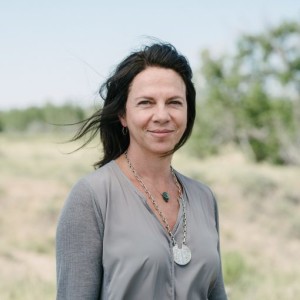
Wednesday Oct 03, 2018
Wednesday Oct 03, 2018
Good day and welcome to Tractor Time podcast. I’m your host, Ryan Slabaugh, the GM of Acres U.S.A., and we are excited to bring you another fun hour of conversation about ecology, agriculture, smart farming, human health – and more.
I want to thank our listeners. We recently went over the 20,000th download as a podcast, which is exciting for us. The world of eco-growers is always larger than we anticipate, and to us, that means things are changing for the positive. We hear so much about degenerative agriculture and its toxic toll on our world, but there is a silver lining – you. The listeners who are fighting tradition and convention with smart growing tactics, by understanding the soil, are the solution, and slowly but surely, we are making progress. It’s important we all agree on that one. It’s not that we don’t have challenges, and that they are not large and complicated, but we do not that the base-level agreement we want to get to is that the Earth, and its complicated and resilient life forms, will tell us what we need to know to grow our food. But it does require us to listen.
Okay, the high horse is getting tired, but it’s true. Our listeners are the silver lining, and one of the brightest spots on that lining is our guest today.
Daniela Ibarra-Howell is a native Argentinian, an agronomist by profession, and has more than 25 years of ranching experience. In 2009, she helped start The Savory Institute, headquartered in Boulder, Colorado, and became its CEO in 2011. Since then, she’s served on initiatives as wide as the UN Global Impact study, among a number of other roundtables and think tanks for healthy food and healthy agriculture. They are just too many to name.
Daniela will be a big part of Acres USA in the next couple months, a fact that we are very grateful for. She will be speaking at our annual conference in Louisville, Kentucky, Dec. 4-7, and keynoting an evening there. She will be featured in the November issue of our magazine, with an interview with Chris Walters. And, of course, we’re proud to have Daniela Howell on the Tractor Time podcast today.
Learn more about the Savory Institute at https://www.savory.global/.
Learn more about Acres U.S.A. at www.acresusa.com, or read our free, helpful content at www.ecofarmingdaily.com. You can find this contest on both sites, or for free in the Apple Podcast store.
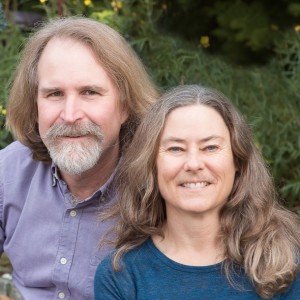
Thursday Sep 13, 2018
Thursday Sep 13, 2018
Good day and welcome to Tractor Time, a podcast brought to you by Acres U.S.A. Today’s podcast features two guests. Both live together in Seattle, and are writers, advocates and change agents and, it should be noted, both are quite brilliant as well – Biologist Anne Biklé and Geologist David Montgomery.
We have interviewed both separately, and will run their interviews back-to-back.
Our second interview you will hear on this episode, Anne Biklé, is a biologist with an interest in environmentalism and, most recently, soil life. She’s an active speaker and author of The Hidden Half of Nature: The Microbial Roots of Life and Health, which is available in our bookstore at acresusa.com.
We are going in depth on new science into life in the soil, and discuss the significance of all the new information to farmers and growers.
But to set the stage, we will get to our first guest, David Montgomery, Anne’s co-author on The Hidden Half of Nature, and a writer, geologist, professor, and researcher who will set the stage for Anne’s deep-dive into the soil. It’s also worth noting that David is a recognized genius – or at least, someone who has been recognized as the closest thing to it. David Montgomery is a Professor of Earth and Space Sciences at the University of Washington in Seattle, and a member of the Quaternary Research Center.
In 2008, In 2008 Montgomery received a MacArthur Fellowship, generally known as the “genius grant,” for his work as a researcher and writer.
His early work began in topics of topography and geology. He was all over the television after the tragic landslide in 2014 in his homestate of Washington, and since then, has published books connecting the ideas of healthy soil and healthy civilizations.
In 2016, Montgomery published "The Hidden Half of Nature: The Microbial Roots of Life and Health", a collaboration with Anne Biklé. The book addresses the relationship between microbial life, plants, and people.
His most recent work, Growing A Revolution: Bringing Our Soil Back to Life, released in May 2017.
Both are available from Acres U.S.A. store.
We welcome David Montgomery and Anne Bilké to the Tractor Time podcast.
Also, find all of the Tractor Time podcasts here, or for free in the iTunes store.
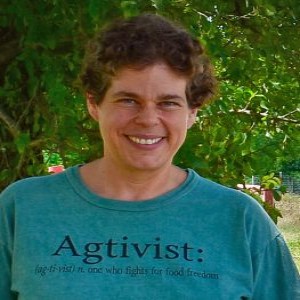
Friday Sep 07, 2018
Friday Sep 07, 2018
Good day and welcome to Tractor Time podcast brought to you by Acres USA. I am your host, Ryan Slabaugh, and we are excited to bring you another episode – this one will be about advocacy, and how to get involved to make real change happen.
Our guest today embodies that sentiment, Judith McGeary. Those who attend our conference every year should know her name, as she is a frequent speaker. But why we ask her to speak is most important – that she is the founder and leader of the Farm and Ranch Freedom Alliance, and represents about 1,000 ranchers and farmers in Texas who help advocate for government to better represent all of its constituents, not just the huge corporate farming interests. She’s also a rancher herself at the McGeary Family Farm a couple hours outside of Austin, Texas.
How she found her way into this role is something we’ll discuss during the podcast, and her story is inspiring. It involves a career change, and some life-changing moments with farmers and politicians.
Not only does Judith lead FARFA, but she serves as the executive director of the Council for Healthy Food Systems and on the board of the Farm-to-Consumer Legal Defense Fund. And this year, she’s leading the Raise Your Voice Tour to learn more about what type of advocacy farmers and ranchers need the most. We’ll get into that, and more, in this 40-minute talk.
You can learn more about FARFA at farmandranchfreedom.org, and their October conference. You can learn more about the Acres USA conference, where FARFA will be presenting, at www.acresusa.com.